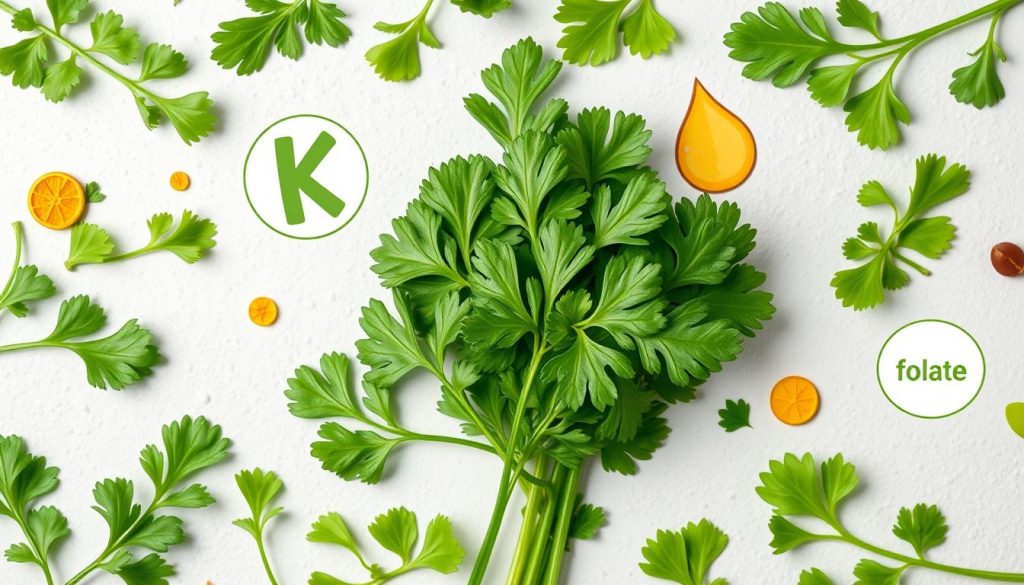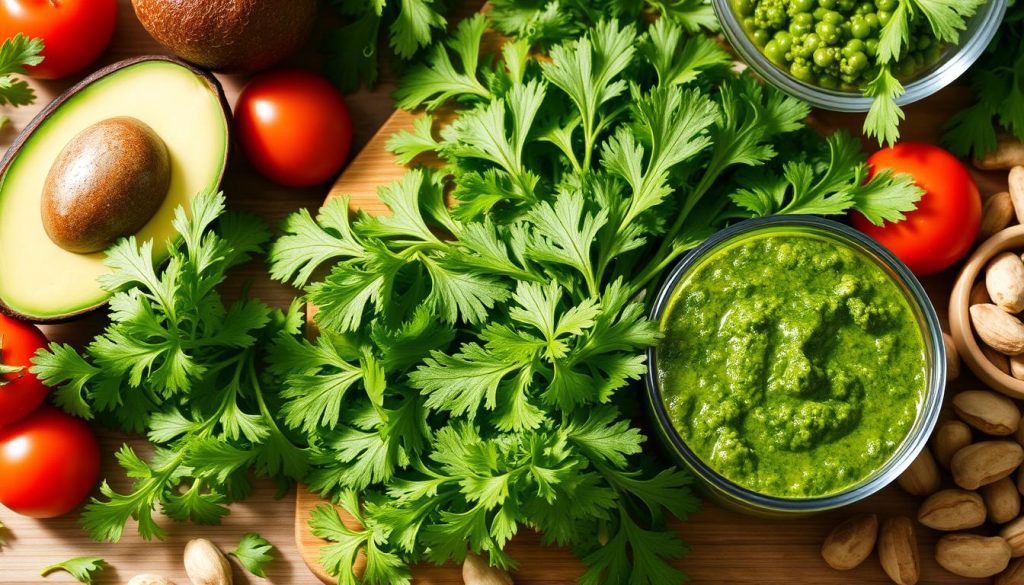Parsley is moving from being just a garnish to a key player in our meals. The question is parsley nutritious opens up a world of parsley health benefits. It’s not just about looks; parsley is packed with goodness for our hearts and more.
It’s gaining fame as a parsley superfood. This is a big deal in health talks and food trends.
As we look for foods that do more than fill our bellies, parsley shines. It’s full of nutrients. This article will explore parsley’s health perks, backed by science. We’ll see why parsley is becoming a top superfood.
Introduction to Parsley as a Nutritional Powerhouse
Parsley comes from the Mediterranean and is loved for its taste and health perks. Looking into the parsley nutrition facts, it’s easy to see why it’s so good for you. This herb is more than a garnish; it’s full of vitamins, minerals, and antioxidants that boost health.
Parsley is famous worldwide for its fresh, peppery taste. It’s not just for food; it’s packed with vitamin C, vitamin K, and iron. These nutrients make parsley a key part of a healthy diet. Let’s dive into what makes parsley so valuable in our meals.
| Nutrient | Content in Parsley | Benefits |
|---|---|---|
| Vitamin C | 133 mg per 100g | Boosts immunity, antioxidant protection |
| Vitamin K | 1640 µg per 100g | Supports bone health, aids in blood clotting |
| Iron | 6.2 mg per 100g | Essential for blood production, oxygen transport |
| Folate | 152 µg per 100g | Crucial for cell division, prevents birth defects |
Knowing these parsley nutrition facts shows us why we should eat parsley. It’s not just tasty; it’s also great for our health. Keep reading to learn more about parsley’s amazing benefits.
Is Parsley Nutritious? Breaking Down Its Nutrient Content
Parsley is more than just a garnish. It’s packed with important nutrients. It has vitamins like C, K, and A, and minerals like iron and folate. This makes it great for boosting your diet.

Parsley is full of benefits for your health. Here’s a closer look at what makes it so valuable:
- Vitamin K – important for bone health and blood clotting
- Vitamin C – a strong antioxidant that helps repair tissues and makes neurotransmitters
- Vitamin A (from beta-carotene) – key for vision, the immune system, and reproduction
- Folate – needed for cell division and making DNA and other genetic material
- Iron – essential for making healthy red blood cells and carrying oxygen
Parsley is also low in calories, which is great for weight management. Adding parsley to your meals boosts flavor without extra calories. It also adds important nutrients for staying healthy.
Exploring the Health Benefits of Parsley
Parsley is known for its bright taste and use as a garnish. But it also has many health benefits. It’s packed with vitamins and antioxidants. These help prevent and heal many health issues.
Parsley can improve heart health, reduce inflammation, and boost the immune system. This makes it a superfood with amazing parsley health properties.
Parsley’s Role in Heart Health
Parsley is full of vitamin C and flavonoids. These help lower the risk of heart disease. It has antioxidants that reduce cholesterol and blood pressure.
Its folate helps turn harmful homocysteine into safe substances. This is good for blood vessels.
Anti-Inflammatory Effects of Parsley
The anti-inflammatory effects of parsley come from vitamin C and carotenoids. Inflammation causes many chronic diseases like arthritis. Eating parsley can help manage and prevent these issues.
Immune-Boosting Properties of Parsley
Parsley boosts the immune system. It’s rich in vitamins A and C. These vitamins improve immunity and skin health by fighting oxidative stress.
Eating parsley, even when sick, can strengthen the body’s defenses. This shows the deep benefits of parsley.
Parsley Vitamins and Minerals: What You Need to Know
Parsley is packed with vitamins and minerals that are good for you. It’s not just for adding flavor to food. It also boosts your health with important nutrients. Let’s explore the vitamins and minerals in parsley that make it great for your diet.
Parsley nutrition facts show it’s full of vitamins A, C, and K. Vitamin A helps your eyes and skin. Vitamin C keeps your immune system strong and helps your body use iron. Vitamin K is key for strong bones and blood clotting.
- Vitamin A: Supports vision and immune function.
- Vitamin C: Necessary for the growth, development, and repair of all body tissues.
- Vitamin K: Key role in helping blood clot, preventing excessive bleeding.
Parsley also has important minerals like iron and magnesium. Iron helps make hemoglobin, which carries oxygen in your blood. Magnesium is good for your body and brain health.
| Vitamin/Mineral | Amount per 100g | % Daily Value |
|---|---|---|
| Vitamin A | 8424 IU | 168% |
| Vitamin C | 133 mg | 148% |
| Vitamin K | 1640 µg | 1367% |
| Iron | 6.2 mg | 34% |
| Magnesium | 50 mg | 12% |
Parsley nutrition facts show it has a lot of Vitamin K. This makes parsley a special herb. Adding parsley to your meals boosts flavor and nutrition.

Parsley Superfood Status: Fact or Fiction?
The question of whether parsley is a ‘superfood’ is debated by health enthusiasts. It’s not just for decoration; parsley is packed with nutrients. This makes it a strong contender with other green superfoods.
Comparing Parsley to Other Green Superfoods
Looking at the benefits of parsley compared to other green superfoods, its nutrient mix is unique. It’s full of vitamins A, C, and K, and minerals like iron, calcium, and potassium. This makes parsley a top choice in the superfood world.
| Nutrient | Parsley (per 100g) | Other Green Superfoods (per 100g) |
|---|---|---|
| Vitamin A | 8424 IU | 1932 IU |
| Vitamin C | 133 mg | 120 mg |
| Calcium | 138 mg | 99 mg |
| Iron | 6.2 mg | 2.7 mg |
| Potassium | 554 mg | 558 mg |
The Unique Compounds in Parsley
Parsley is more than just vitamins. It’s also rich in flavonoids like apigenin, luteolin, and myricetin. These compounds are known for their antioxidant powers. This makes parsley a parsley superfood with benefits like fighting inflammation and boosting the immune system.
Reasons to Eat Parsley: Beyond Nutrition
Looking into reasons to eat parsley goes beyond its known health perks. This part talks about its use in cooking and its special nutritional benefits. It shows why parsley should be a key part of your meals.
The Versatility of Parsley in Recipes
Parsley is more than just a garnish. It’s a versatile herb that boosts the taste of many dishes. It adds a fresh, slightly peppery flavor to soups, salads, marinades, and sauces. Its ability to fit into various cuisines makes it a must-have in kitchens everywhere.
Dietary Fiber and Digestive Health Benefits
Parsley’s dietary fiber is great for your digestive health. It helps with regular bowel movements and keeps your gut healthy. Foods high in fiber, like parsley, can prevent digestive problems and help you feel full, which is good for weight control.
- Enhances flavor without overpowering other ingredients
- Supports digestive health with its high fiber content
- Contributes to satiety, which can aid in weight control

Adding parsley to your diet is easy. You can use it fresh or as dried spice. It makes simple dishes look and taste better with its bright color and health benefits. So, the reasons to eat parsley go beyond its nutrients, making it a great choice for a healthy diet.
The Antioxidants in Parsley: A Closer Look
Exploring the benefits of parsley often highlights its rich antioxidant profile. These antioxidants fight oxidative stress, which can cause chronic diseases. This section will look into the antioxidants in parsley and their role in health.
Antioxidants in parsley, like flavonoids, carotenoids, and vitamin C, are key. They neutralize harmful free radicals in the body. These molecules help protect against environmental and metabolic stressors, boosting overall health.
- Flavonoids: They help reduce the risk of chronic diseases by controlling inflammation.
- Carotenoids: Important for healthy vision, skin, and immune function.
- Vitamin C: It boosts the immune system and aids in tissue repair.
Together, these antioxidants play a big role in parsley’s health benefits. They support preventative health and help the body stay healthy and strong. Adding parsley to meals can be a natural way to fight off daily oxidative stress.
How Parsley Health Benefits Your Skin and Hair
Parsley is more than just a garnish. It’s a treasure trove of nutrients that can make your skin and hair glow. It’s packed with goodness that boosts both your skin and hair health.
Natural Beauty Remedies Using Parsley
Thanks to its parsley nutrition facts, parsley can calm irritated skin, fight acne, and even make your hair grow faster. Here are some easy parsley beauty treatments:
- Facial Mask: Mix parsley leaves with yogurt and honey for a face mask that hydrates.
- Scalp Treatment: Steep parsley leaves in boiling water, let it cool, then use it as a rinse to brighten and grow your hair.
Parsley’s Hydrating Effects on the Skin
Parsley’s hydrating powers for the skin are amazing. It’s full of vitamin C and flavonoids. These help keep your skin elastic and hydrated.
| Nutrient | Benefit for Skin | Benefit for Hair |
|---|---|---|
| Vitamin C | Antioxidant, boosts collagen production | Prevents hair follicle aging |
| Iron | Enhances complexion | Improves hair strength |
| Vitamin A | Promotes skin cell regeneration | Moisturizes the scalp |
| Zinc | Fights acne | Prevents hair loss |

Boosting Bone Health with Parsley Vitamins and Minerals
Exploring the benefits of parsley shows its key role in bone health. Parsley is more than a garnish; it’s packed with nutrients for strong bones.
Parsley is rich in Vitamin K, which is great for bones. Vitamin K helps your body absorb calcium better and keeps calcium in your bones. Each parsley serving gives you a good amount of Vitamin K, making it a must for a bone-healthy diet.
Parsley also has calcium, which is essential for bones. While it doesn’t meet all your daily calcium needs, it helps a lot. Eating parsley with other calcium-rich foods can boost your bone density and lower fracture risks.
Here’s how the parsley vitamins and minerals help strengthen bones:
| Nutrient | Role in Bone Health | Amount in Parsley |
|---|---|---|
| Vitamin K | Improves calcium absorption | 1640 µg per 100 g |
| Calcium | Crucial for bone structure | 138 mg per 100 g |
| Magnesium | Supports bone integrity | 50 mg per 100 g |
| Vitamin C | Collagen synthesis for bone tissue | 133 mg per 100 g |
Learn more about vitamin deficiencies and their effects on health at important vitamin knowledge.
The benefits of parsley go beyond taste. They work hard to support your health. Adding parsley to your meals adds flavor and essential nutrients for strong bones, showing the power of parsley vitamins and minerals.
Parsley and Weight Management: Understanding the Connection
Parsley is known for its taste and health benefits. It plays a big role in helping people manage their weight. This section looks at how is parsley nutritious helps with low-calorie diets and controlling hunger. It shows how parsley is good for weight management.
Low-calorie Addition to Meals
Adding parsley to your meals is smart for weight management. It has very few calories. This lets you add flavor to your food without eating too many calories.
How Parsley Can Aid in Appetite Control
Parsley’s fiber helps you feel full, which can lower your appetite. This is key for managing your weight. Plus, parsley’s texture and taste make it a great choice for meals. It helps you eat less and control your portions.
| Nutrient | Amount | Benefit |
|---|---|---|
| Fiber | 1.0 g per 1/2 cup | Enhances satiety |
| Calories | 11 calories per 1/2 cup | Low-calorie content helps maintain energy intake |
| Vitamins (A, C, K) | Rich in vitamins | Supports overall wellness, important for fat metabolism |
The Detoxifying Effects of Parsley in Your Diet
Parsley is not just tasty; it’s also great for detoxifying your body. It’s packed with nutrients that help your liver and keep your body fluids balanced. This makes it a top choice for anyone looking to improve their health.
Parsley’s Role in Liver Health
Parsley is a liver superfood because of its antioxidants. These compounds fight oxidative stress in the liver. This stress reduction boosts liver function and helps it clear out toxins more efficiently.
Encouraging Proper Body Fluid Balance
Parsley also helps with body fluid balance. Its diuretic properties increase urine production. This helps remove excess fluids and toxins, preventing bloating and supporting kidney health.
Parsley Nutrition Facts: A Scientific Analysis
Exploring the parsley nutrition facts shows why it’s good for us. This herb is not just tasty; it’s also packed with nutrients. Let’s look at what makes parsley so beneficial for our health.

Parsley is full of vitamins and minerals. These help our bodies in many ways. They boost our immune system and support strong bones.
| Nutrient | Amount per 30g | % Daily Value |
|---|---|---|
| Vitamin C | 24 mg | 32% |
| Vitamin K | 574 mcg | 478% |
| Folate | 23 mcg | 6% |
| Iron | 1.2 mg | 6% |
| Fiber | 0.6 g | 2% |
The parsley nutrition facts show it’s a health superstar. Vitamins K and C are key for fighting diseases and keeping our diet balanced. This makes parsley a valuable addition to our meals.
- Vitamin C in parsley boosts the immune system and functions as a powerful antioxidant.
- Vitamin K is essential for bone health and wound healing.
- The iron content helps in the proper production of red blood cells.
- Dietary fiber aids in digestion and promotes gut health.
The parsley nutrition facts and health benefits make a strong case for using it often. Parsley adds flavor and nutrition to our food, making it a great choice for any meal.
Culinary Uses: How to Incorporate More Parsley into Your Meals
Exploring the reasons to eat parsley and its reputation as a parsley nutritional powerhouse can inspire anyone to add this herb to their daily diet. Here, we dive into effective ways to add more parsley to your cooking. We also compare the benefits and flavors of fresh and dried parsley.
Fresh vs. Dried Parsley: Nutritional Considerations
Choosing between fresh and dried parsley affects nutritional value. Fresh parsley keeps more vitamins and adds vibrant color and taste to dishes. Dried parsley is convenient for storage and more concentrated, but it might be less flavorful and less nutritious.
Complementary Flavors: Pairing Parsley in Cooking
Parsley’s mild, slightly peppery flavor complements many dishes, adding flavor without overpowering. Here are some favorite pairings:
- Blend with garlic and lemon zest for a zesty marinade.
- Mix with tomatoes and basil for a refreshing salad.
- Combine with potatoes and olive oil for a hearty side dish.
| Ingredient | Recipe Ideas |
|---|---|
| Chicken | Parsley and lemon chicken bake |
| Fish | Herb-crusted cod with parsley |
| Beef | Grilled steak with chimichurri sauce |
| Vegan dishes | Stuffed bell peppers with parsley and rice |
Adding parsley to meals boosts flavor and nutritional intake, following the reasons to eat parsley. Whether fresh or dried, parsley is a kitchen staple for its versatility and health benefits.
Addressing Common Misconceptions About Parsley Health Properties
When we talk about parsley health properties, myths often get in the way of the truth. By clearing up these myths, we can better understand: is parsley nutritious?
Many think parsley is just a garnish with little nutritional value. But parsley is packed with vitamins and minerals like Vitamin C, Vitamin K, and iron. It’s much more than a pretty face on your plate.
- Parsley is full of antioxidants, which help fight off harmful free radicals in our bodies.
- Its high vitamin K content is great for our bones, helping them stay strong and healthy.
Some also think parsley doesn’t do much for our health. But adding it to our meals regularly can really help. It boosts our immune system and helps our body work better.
| Nutritional Component | Health Benefit | Common Misconception |
|---|---|---|
| Vitamin C | Boosts the immune system | Viewed only as a source of flavor |
| Iron | Prevents anemia | Overshadowed by other iron-rich greens |
| Folate | Supports cell division and DNA synthesis | Often unrecognized in dietary discussions |
With these facts about parsley health properties, it’s clear parsley is more than just a garnish. It’s a superfood that deserves a spot in our diets. Here’s an image to show just how nutritious parsley is:
By debunking these myths, we not only learn more about parsley’s nutritional value. We also encourage people to include parsley in their meals for its many health benefits.
Potential Side Effects and Precautions When Consuming Parsley
Parsley is known for its health benefits and is packed with vitamins and minerals. But, it’s important to eat it in moderation. This herb is full of nutrients that can boost your diet. Yet, there are risks to consider, mainly for people with certain health issues or taking specific medicines.
Parsley has a lot of vitamin K, which can affect blood clotting. So, people on blood thinners should be careful. Also, eating too much parsley can cause skin problems or make you more sensitive to sunlight, if used as an essential oil or in large amounts.
Pregnant women should not eat too much parsley. Some compounds in it, like myristicin, can be harmful in large amounts. People with kidney stones should also be cautious. Parsley has oxalates, which can increase the risk of kidney stones.
Eating parsley in moderation is best. It can add important vitamins and minerals to your diet without causing harm. Always talk to a doctor before adding parsley to your diet, if you have health issues or take certain medicines. This way, you can enjoy parsley safely.
FAQ
Q: How does parsley benefit your health?
A: Parsley is packed with vitamins and minerals. It has anti-inflammatory properties and supports the immune system. It also fights oxidative stress with antioxidants.
Q: Is parsley considered a superfood?
A: “Superfood” isn’t a scientific term. But, parsley is often called one. It’s full of nutrients like flavonoids and vitamins.
Q: What nutrients are found in parsley?
A: Parsley is rich in vitamins A, C, and K. It also has minerals like iron and potassium. Its volatile oils and flavonoids add to its health benefits.
Q: Can parsley improve heart health?
A: Yes, parsley is good for the heart. It’s full of antioxidants. It helps manage blood pressure and homocysteine levels.
Q: Does parsley have anti-inflammatory effects?
A: Yes, parsley has anti-inflammatory compounds. Vitamin C and carotenoids in it can reduce inflammation.
Q: How can parsley help to boost the immune system?
A: Parsley’s vitamin C boosts the immune system. Its antibacterial properties also help fight infections.
Q: Aside from its nutritional benefits, are there other reasons to eat parsley?
A: Yes, parsley is versatile in cooking. It’s also high in dietary fiber, which aids digestion.
Q: What makes parsley beneficial for skin and hair?
A: Parsley hydrates the skin and hair. It’s rich in vitamins A and C, improving skin quality. It’s also used in beauty remedies.
Q: Can parsley support bone health?
A: Yes, parsley’s calcium and vitamin K help keep bones strong. They support skeletal health.
Q: How does parsley aid in weight management?
A: Parsley is low in calories. It can add flavor to meals without extra calories. It may also help control appetite.
Q: Does parsley have a role in the body’s detoxification processes?
A: Parsley supports detoxification. It promotes liver health and helps with fluid balance. Its mild diuretic effects are beneficial.
Q: In what ways can parsley be incorporated into meals to enhance nutrition?
A: Use parsley fresh or dried in soups, stews, salads, and sauces. It boosts flavor and nutrition in meals.
Q: Are there any common misconceptions about parsley’s health properties?
A: Yes, some think parsley is a cure-all. It’s nutritious but should be part of a balanced diet, not a single solution.
Q: Are there any potentially harmful side effects of consuming parsley?
A: Parsley is safe in normal amounts. But too much can cause anemia or liver/kidney issues. People with health problems should talk to a doctor before eating a lot of parsley.


















